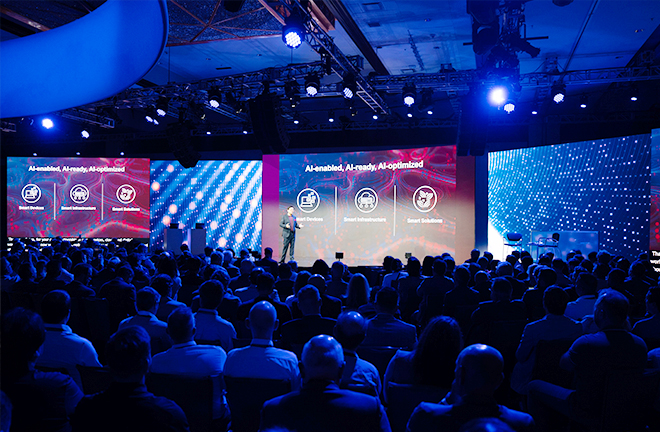AIGC accelerates international technopolitical change

Lenovo Tech World 2023 was held on Oct. 24-25 in Austin, Texas, USA. Photo: Liu Guanguan/CNSphoto
Strategic competition in science and technology is an important factor driving the rise and fall of great powers, power transfer among them, as well as changes and shifts in the international order. AIGC (Artificial Intelligence generated content) technology is likely to further propel the transition from traditional geopolitics to technopolitics and trigger a new round of AI competition.
Uneven development
AIGC technology could deeply reshape the relations between capital and labor in the global political and economic system, and bring about disruptive changes in the production modes, organizational modes, and production relations of human society. AI tools may replace humans in labor-intensive industries and knowledge-intensive industries, resulting in the shrinking of the middle class and the division of society into a minority consisting of technological elites with financial capital, and a majority consisting of ordinary people.
Advancements in AIGC technology may cause structural unemployment on a global scale, aggravating the polarization of social wealth. The unevenness of global political-economic development could become more prominent, making it more difficult for underdeveloped countries to find the right position for themselves in the international division of labor, and widening the economic gap between the global North and South. AIGC technology could also impact the development of global trade, finance, and other sectors, reshaping industrial, supply, and value chains.
Power redistribution
AI technology has spurred the redistribution and consolidation of the power of international actors. Non-state actors such as international organizations, tech industry giants, and multinationals are playing increasingly prominent roles within the global community. With the adoption of ChatGPT and similar AI tools, social forces such as private tech companies are on the rise. Equipped with state-of-the-art technologies and vast amounts of data, these actors exercise control over algorithmic development, enhancing knowledge construction and exerting significant sway over public opinion.
AI technology reinforces the technological hegemony of countries dominating AI-related fields, which in turn consolidates their military and financial hegemony. Leveraging the “first-mover advantage” in AI, these countries can compel others to depend more on them.
Disparities between the Global North and South could widen further as AIGC technology advances. As the leading countries in AI continue to widen the technological gap, most developing nations are left further behind. Consequently, in the long term, smaller and medium-sized countries may encounter more severe challenges to their survival, as their power diminishes and they become increasingly entrenched in hegemonic “center-periphery” dynamics.
Destabilizing international order
AI technology has the potential to profoundly change the nature of warfare. Future conflicts may see the deployment of robots, and AI has the capability to expedite decision-making and implementation during wartime. AIGC technology further complicates and obscures information warfare and public opinion warfare, while also threatening national data and information security. The emergence of social bots makes public opinion more complicated and elusive, making it more challenging for governments to regulate and guide.
AIGC is likely to further entrench technological colonization, technological monopoly, technological nationalism, and technological protectionism. Current AI laws, regulations, policies, and principles are defined by Western countries, while developing countries have little say in the formulation of AI governance norms and rules. Primarily trained on data from Western countries, large language models might inadvertently contribute to cross-cultural and racial discrimination.
The advancement of AIGC not only intensifies competition in AI technology itself, but also has implications for national security and development strategies. Its influence extends beyond industrial, economic, and social realms, threatening to spill over to other fields such as international politics, international public opinion, and global governance. At present, the construction of a global governance order, rules, and norms lags far behind progress in AI, hence the imperative to formulate global governance solutions aimed at strengthening privacy protection, information security, traceability, and accountability.
Ye Shulan is a professor in the School of Politics and International Relations at East China Normal University.
Edited by WANG YOURAN
